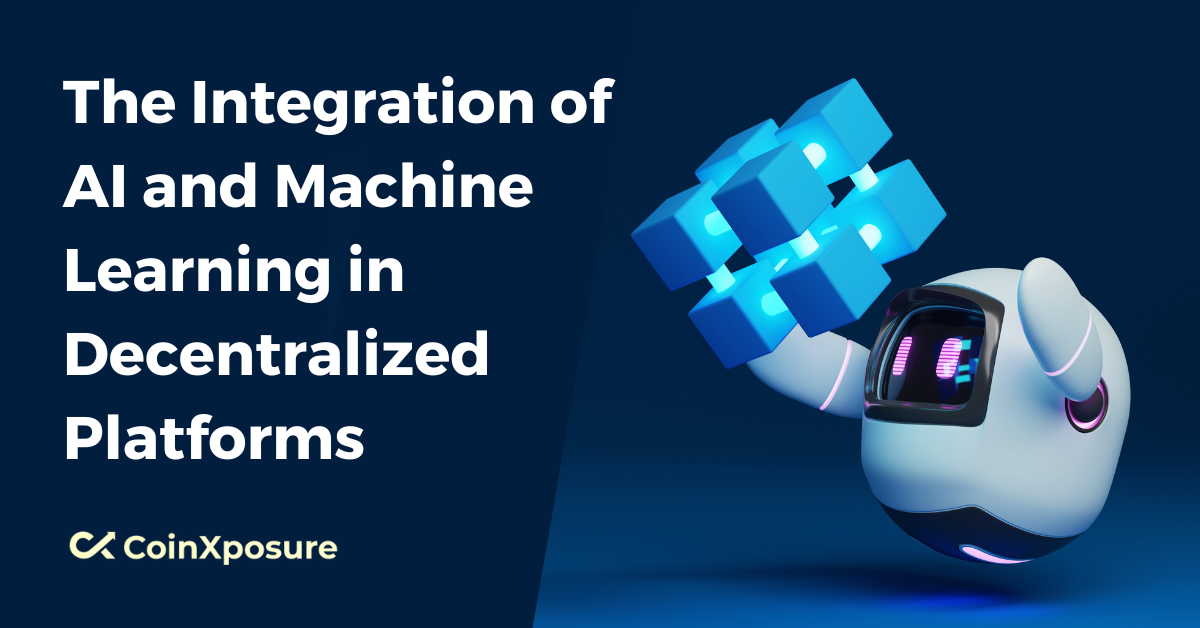
The Integration of AI and Machine Learning in Decentralized Platforms
The integration of artificial intelligence (AI) and machine learning (ML) in decentralized platforms represents a groundbreaking convergence of cutting-edge technologies that have the potential to transform the way we interact with and utilize decentralized systems.
Decentralized platforms, such as blockchain and decentralized applications, have gained prominence for their trustless, secure, and transparent nature.
By infusing AI and ML into these platforms, we unlock new capabilities for automation, intelligent decision-making, and data-driven insights, offering a powerful synergy that promises to reshape industries, enhance security, and drive innovation.
In this article, we delve into the symbiotic relationship between AI, ML, and decentralized systems, examining their applications, challenges, and the promising future they offer.
Understanding Decentralized Platforms
Decentralized platforms are innovative technology ecosystems that fundamentally change how data and services are stored, processed, and distributed.
They are characterized by the absence of a central authority or intermediary, relying instead on distributed networks and cryptographic principles. Here’s a brief understanding:
- Decentralization
- Blockchain Technology
- Smart Contracts
- Decentralized Applications (DApps)
- Transparency and Security
Decentralization
In decentralized platforms, data and control are distributed across a network of nodes (computers). This dispersal of authority reduces the reliance on a single point of failure and enhances resilience.
Blockchain Technology
Many decentralized platforms are built on blockchain technology. Blockchain is a distributed ledger that records transactions across a network of computers securely and transparently. It is most famously associated with cryptocurrencies like Bitcoin.
Smart Contracts
Smart contracts are self-executing contracts with the terms of the agreement directly written into code. They enable automated and trustless transactions on decentralized platforms.
Decentralized Applications (DApps)
These applications run on decentralized networks, offering various functionalities beyond just cryptocurrencies. DApps are designed to be open-source and autonomous.
Transparency and Security
Decentralized platforms are known for their transparency and security. The data on the blockchain is immutable, and the consensus mechanisms ensure the accuracy and security of transactions.
These platforms are being explored across multiple industries, from finance and supply chain management to healthcare and entertainment, due to their potential to increase efficiency, reduce costs, and enhance security and transparency.
However, they also come with their own set of challenges, including scalability issues and regulatory concerns.
The Role of AI in Decentralized Platforms
The role of AI in decentralized platforms is multifaceted and transformative. Here are some key aspects:
- Automated Decision-Making
- Data Analysis
- Predictive Analytics
- Natural Language Processing (NLP)
- Enhanced Security
Automated Decision-Making
AI can enable smart contracts and decentralized applications (DApps) to make automated, intelligent decisions based on predefined rules and real-time data. This is particularly useful for automated trading, insurance claims processing, or supply chain management.
Data Analysis
AI can analyze vast amounts of data stored on decentralized ledgers, extracting valuable insights. This can be applied in various fields, such as financial analytics, fraud detection, and market research.
Predictive Analytics
AI and machine learning models can make predictions based on historical data stored on the blockchain. This is useful for forecasting trends, risk assessment, and demand prediction.
Natural Language Processing (NLP)
AI-driven NLP can be used to analyze and understand unstructured data stored on decentralized platforms. It allows for sentiment analysis, chatbots, and content curation in DApps.
Enhanced Security
AI can be used for threat detection and security monitoring on decentralized networks. It can identify suspicious activities, such as unauthorized access attempts or fraudulent transactions, enhancing the overall security of the platform.
Integrating AI in decentralized platforms enhances their capabilities, making them more efficient, intelligent, and adaptable to changing conditions.
It also enables the development of innovative applications across various industries. Still, it comes with challenges, including data privacy and regulatory concerns, that must be addressed for a successful and responsible implementation.
Machine Learning in Decentralized Systems
Machine learning (ML) is crucial in decentralized systems by offering advanced data analysis and prediction capabilities. Here’s an overview of how machine learning is applied in decentralized systems:
- Data Analysis and Pattern Recognition
- Fraud Detection
- Predictive Analytics
- Risk Assessment
- Natural Language Processing (NLP)
Data Analysis and Pattern Recognition
ML algorithms can analyze large volumes of data stored on decentralized platforms, identifying patterns and trends that may not be apparent through traditional data analysis methods. This is particularly valuable for making data-driven decisions and gaining insights from blockchain data.
Fraud Detection
ML models can be trained to detect fraudulent activities on decentralized networks. This includes identifying suspicious transactions, potentially malicious nodes, and other anomalies in the blockchain or decentralized application.
Predictive Analytics
Machine learning can be used to build predictive models based on historical data recorded on the blockchain. For example, it can predict market trends, asset prices, or supply chain disruptions, helping businesses make more informed decisions.
Risk Assessment
In financial and insurance applications, ML can assess risk factors and calculate risk scores based on the data available in decentralized systems. This assists in determining creditworthiness, insurance premiums, and investment strategies.
Natural Language Processing (NLP)
NLP models analyze and understand unstructured text data stored in decentralized systems. This benefits sentiment analysis, document classification, and chatbot interactions within decentralized applications.
While machine learning offers substantial benefits for decentralized systems, it also poses challenges. These include data privacy concerns, quality and availability, and addressing regulatory and ethical implications, especially when handling sensitive user data.
The responsible and ethical use of ML in decentralized platforms is essential to ensure the trust and security of these systems.
Challenges and Considerations of Decentralized Platforms
Implementing AI and machine learning in decentralized platforms has unique challenges and considerations. Here are some key ones:
- Data Privacy and Security
- Data Quality
- Regulatory Compliance
- Scalability
- Interoperability
- Energy Consumption
Data Privacy and Security
Decentralized platforms often store sensitive data on the blockchain. Data privacy and security are crucial, as unauthorized access can lead to data breaches. Finding a balance between transparency and privacy is challenging.
Data Quality
The quality and accuracy of data stored on the blockchain are essential for AI and ML models to perform effectively. Garbage data can lead to inaccurate predictions and insights.
Regulatory Compliance
Adhering to existing regulations and navigating the evolving legal landscape for decentralized technologies can be complex. Different jurisdictions have varying rules regarding cryptocurrencies, data handling, and smart contracts.
Scalability
Scalability is a significant concern, especially in blockchain-based systems. As more data is added to the blockchain, processing it in a timely and efficient manner becomes challenging.
Interoperability
Integrating AI and ML technologies into existing decentralized systems can be complicated due to interoperability issues. Ensuring seamless interaction between different components and protocols is crucial.
Energy Consumption
Some blockchain networks, such as Bitcoin and Ethereum, consume significant energy for consensus mechanisms. Finding eco-friendly solutions while implementing AI and ML is a consideration for sustainability.
Addressing these challenges and considerations requires technical expertise, ethical considerations, regulatory compliance, and a forward-thinking approach to technology adoption.
It’s essential to approach the integration of AI and ML in decentralized platforms with a holistic perspective to maximize benefits while mitigating risks.
Future Trends and Innovations AI and Machine Learning in Decentralized Platforms
Integrating AI and machine learning in decentralized platforms is an ever-evolving field with exciting future trends and innovations. Here are some of the critical developments to watch for:
- Enhanced Decentralized Finance (DeFi)
- AI-Driven Predictive Analytics
- Decentralized Autonomous Organizations (DAOs)
- Decentralized Identity Verification
- Cross-Blockchain Interoperability
- Scalability Solutions
- AI-Generated Content
Enhanced Decentralized Finance (DeFi)
AI and ML will continue to play a significant role in DeFi by improving risk assessment, automated trading strategies, and fraud detection, ultimately making DeFi platforms more efficient and secure.
AI-Driven Predictive Analytics
AI will be used to develop more accurate predictive models for financial markets, supply chains, and other industries, enabling better decision-making and risk management.
Decentralized Autonomous Organizations (DAOs)
AI will help DAOs become more effective in their decision-making by analyzing proposals and voting patterns, providing insights, and optimizing governance.
Decentralized Identity Verification
AI-driven identity verification will become more sophisticated, offering secure and privacy-conscious solutions for user authentication and identity management on decentralized platforms.
Cross-Blockchain Interoperability
Innovations in AI could lead to improved interoperability between different blockchain networks, enabling seamless data sharing and transactions across various blockchains.
Scalability Solutions
AI and ML will contribute to solutions that enhance the scalability of blockchain networks, reducing bottlenecks and transaction times.
AI-Generated Content
Decentralized content creation platforms will leverage AI to generate text, images, and videos, enabling new forms of user-generated content and creativity.
These trends and innovations represent the continuous evolution of AI and ML in decentralized systems, with the potential to shape various industries, improve security, and foster new economic and governance models.
Staying updated on these developments will be crucial for those interested in the intersection of AI and decentralized platforms.
Conclusion
Integrating artificial intelligence (AI) and machine learning (ML) in decentralized platforms presents a dynamic and promising frontier in the world of technology. These two transformative technologies, when combined with decentralized systems, have the potential to reshape industries, enhance security, and drive innovation.
The integration of AI and ML in decentralized platforms exemplifies the remarkable synergy of technology, enabling a future that is decentralized, efficient, and data-driven.
As this field continues to evolve, it holds the potential to unlock unprecedented opportunities and redefine how we interact with technology and data. It is an exciting journey, and staying informed and engaged in this rapidly advancing space will be vital to harnessing its full potential.





